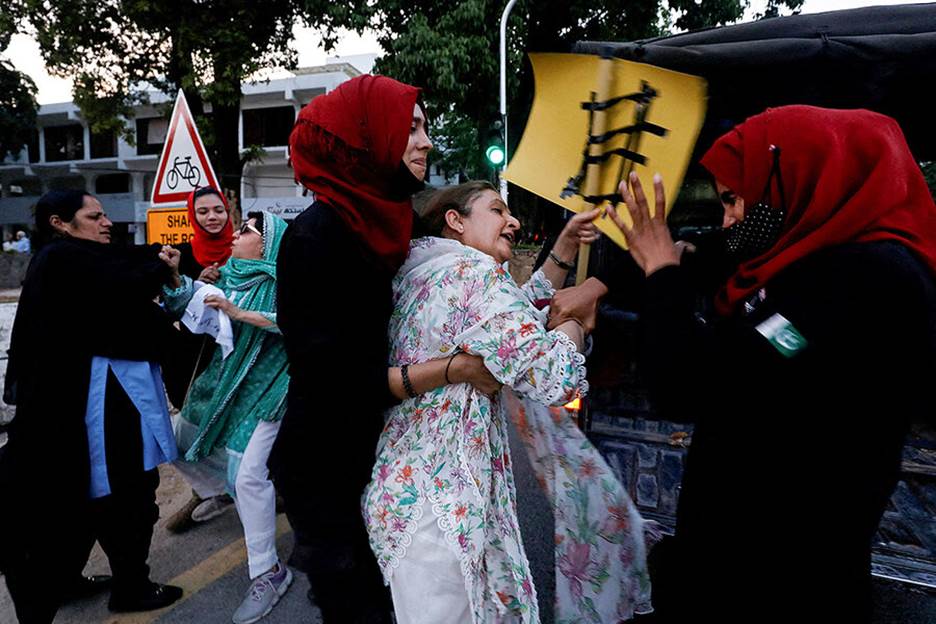
PTI supporters are detained by police officers in Islamabad – Akhtar Soomro/Reuters
Why Pakistan Army Is Targeting Imran Khan’s Party
By Hasan Ali
Islamabad, Pakistan
Pakistan’s powerful military is cracking down on the party founded by ousted Prime Minister Imran Khan, weeks after his supporters took to the streets to protest the politician’s arrest. These protests snowballed into deadly riots targeting military installations across the country, and now the Pakistan Tehreek-e-Insaaf (PTI) party is in shambles.
Thousands of party workers and activists have been thrown in jail. More than 100 top PTI figures have defected. Rights groups decried the intimidation of sympathetic journalists after several overseas commentators were charged with sedition, and local media have been ordered not to mention Mr Khan’s name on air. Islamabad and the adjoining city of Rawalpindi are smattered with posters glorifying the Pakistan army and denouncing the perpetrators of May 9 – a day the army has termed “Pakistan’s 9/11,” though commentators around the world say it bears closer resemblance to the January 6 attack on the US Congress.
Indeed, the army, which recently promised to stop meddling in the country’s political affairs, has launched an organized campaign to dismantle the very party it helped bring to power back in 2018. In spite of the dangers of speaking up against the military, journalists and politicians are questioning the fairness of persecuting ordinary supporters of Mr Khan while the true architects of his rise – the military establishment – remain largely untouched.
“The Pakistan army has a history of reacting harshly against real or perceived attacks on its preeminence,” says Husain Haqqani, former Pakistani ambassador to the United States. “The May 9 attacks on military facilities and installations were larger than anything the army has faced before. ... The crackdown in response has also been disproportionate and heavy-handed.”
Project Imran
In the early 2000s, near the end of Gen Pervez Musharraf’s military rule, the exiled leaders of Pakistan’s two traditional ruling parties, the Pakistan Muslim League and the Pakistan People’s Party, pledged to cooperate to reestablish a civilian-led democracy. As a result of this alliance, Pakistan witnessed its first-ever peaceful transfer of power between civilian governments in 2013. Seeing its influence threatened, the army began to promote Mr Khan and the PTI, a populist party that had seen limited success until this point.
“They decided to do whatever it took to upend that understanding between the existing political forces within the country by injecting Imran Khan into the system,” says political commentator and activist Gul Bukhari. “They had to abduct people; they had to torture people; they had to gag the media” to ensure the former cricketer’s victory in the 2018 elections.
Like virtually every political leader before him, Mr Khan eventually fell out with his benefactors, and after his ouster last year, he began to style himself as an opponent of the army’s outsize role in politics. It was in this context that his supporters took to the streets on May 9 and attacked the army’s command center in Rawalpindi, as well as the residence of the corps commander in Lahore.
According to Ms Bukhari – who was abducted by intelligence agencies in 2018 for her criticism of the military – the crackdown on Mr Khan’s party will have no legitimacy unless the generals who brought him to power are also prosecuted. “Every child knows who the real culprits are,” she says. “The puppets are important. They did play a role ... but if that’s where it stops, that’s not going to resolve our problems.”
Her comments are echoed by Asad Ali Toor, a journalist and vlogger based in Islamabad. The real architects of Project Imran “are playing golf while the ordinary folk who believed their propaganda are rotting in prison,” he says.
Complicated paths to justice
Not everyone agrees, however, that prosecuting the generals is a feasible strategy. Mustafa Nawaz Khokhar, a former senator, says the army’s long history of meddling has created a slippery slope.
“If prosecuting the architects of Project Imran is the right and politically correct position to take, then what about the ones who orchestrated the overthrowing of democracy in ’99?” he asks. “Why even stop there and not go further back and prosecute the architects of Project Nawaz Sharif in the ’80s to set the record straight?”
Military meddling has been a constant in Pakistani politics, he explains, but “when it benefits one section of the elite at the expense of the other, we see tantrums being thrown.”
Mr Khokhar argues that the biggest impact of the May 9 riots has been to give the military an excuse to show its might. “When chips are down, proportionality is hardly a concern in third-world countries. It’s about establishing or reestablishing your position as the ultimate power center,” he says. “As a consequence, the space for discussion revolving around rights and freedoms has greatly shrunk. ... The concerns of prosecution turning into persecution are not unfounded.”
There are others still who question the efficacy of the media blackout on Mr Khan and his party.
“Similar moves in the past have not produced desired results,” says journalist Absar Alam, who was shot by unknown assailants after criticizing the military during Mr Khan’s tenure. “Ideologies can’t be defeated by silencing voices, but I doubt Imran has any ideology. He wants power at any cost, so let’s see.” - The Christian Science Monitor

